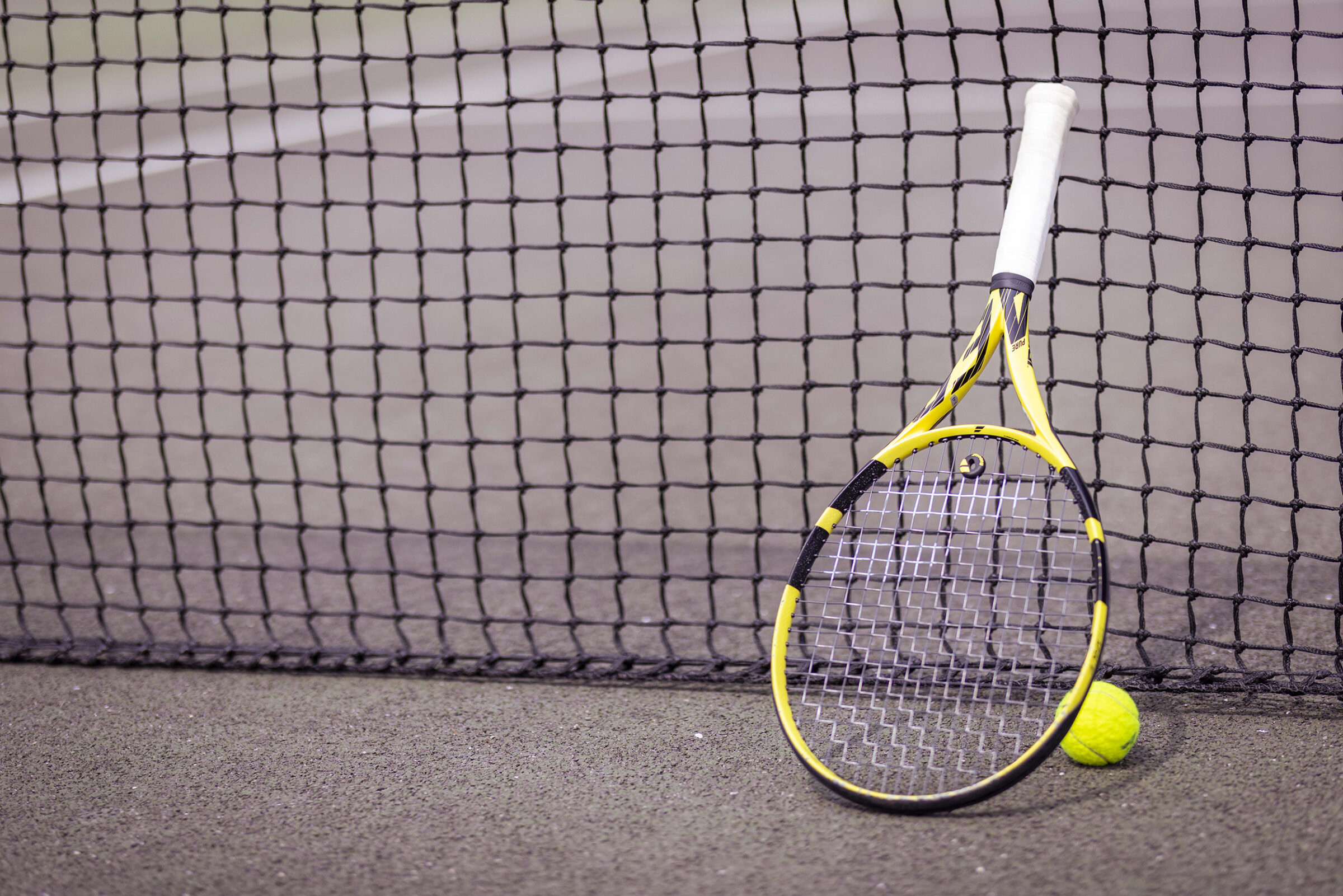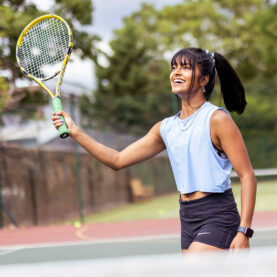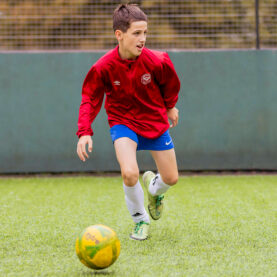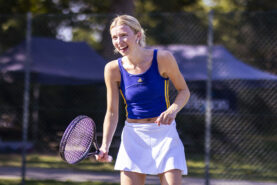
Photography and Filming Policy
This policy was last reviewed on 29.01.26 and is reviewed every three years (or earlier if there is a change in national legislation).
Albert Jarrett, Welfare Officer
Purpose and scope:
Park Sports strives to ensure that all children (anyone under 18) and adults at risk are safeguarded from abuse and have an enjoyable tennis experience.
The purpose of this policy is to:
- protect children who take part in Park Sports’ activities and events, specifically those where photographs and videos may be taken
- set out the overarching principles that guide our approach to photographs/videos being taken of children during our events and activities
- ensure that we operate in line with our values and within the law when creating, using and sharing photographs/videos of children.
This policy applies to all staff, coaches, volunteers, players, parents/carers and any other individuals associated with Park Sports.
We recognise that:
- sharing photographs/videos of our activities can help us celebrate the successes and achievements of our children, provide a record of our activities and raise awareness of our venue/county
- the welfare of the children taking part in our activities is paramount
- children, their parents/carers have a right to decide whether their photograph/video is taken and how these may be used, regardless of age, disability, gender reassignment, race, religion or belief, sex or sexual orientation
- consent to take photographs/videos of children is only meaningful when children, their parents/carers understand how the photographs/videos will be used and stored, and are fully aware of the potential risks associated with the use and distribution
- there are potential risks associated with sharing photographs/videos of children online.
Risks of sharing photographs/videos online:
Sharing photographs/videos of children on social media or other online platforms carries potential risks. For example:
- children may become vulnerable to grooming if a photograph/video is shared alongside information that makes them identifiable. This includes: personal details; a tag with location information; visual details such as a school/venue uniform
- inappropriate photographs/videos of children may be shared online
- photographs/videos may be copied, downloaded, screenshotted or shared by anyone
- photographs/videos of children may be adapted and used inappropriately
- photographs/videos may appear in internet search results
- depending on the terms and conditions of using an online platform, the photographs/videos may be owned by the platform once it’s been posted. Platforms may then license photographs/videos for use by third parties – such as for commercial purposes
- each photograph/video, and any comments on them, become a part of a child’s public image.
We will seek to keep children safe by:
- always asking for written consent from a child and their parents/carers before taking and using a child’s photograph/video
- always explaining what photographs/videos will be used for, how they will be stored and what potential risks are associated with sharing photographs/videos of children
- if consent is withdrawn, take reasonable steps to remove the photographs/videos of the child from public view. It may not be possible to delete or destroy all photographs/videos that have been disseminated online (such as via social media) or in hard copy.
- only using first names of children, unless:
- it’s considered necessary – such as for elite /high profile child players
- it’s in the child’s best interests
- the child and parent have consented (and been informed how, where, in what context a photograph/video might be used, e.g. public website, or through social media, and are aware of potential risks)
- never publish personal information about children
- making sure children, their parents/carers understand how photographs/videos will be securely stored and for how long (including how we will control access to the photographs/videos and their associated information)
- reducing the risk of photographs/videos being copied and used inappropriately by:
- only using photographs/videos of children in appropriate clothing
- avoid photographs/videos and camera angles that may be prone to misinterpretation or misuse
- avoiding full face and body shots of children taking part in activities such as swimming where there may be a heightened risk of photographs/videos being misused
- using photographs/videos that positively reflect children’s involvement in the activity
- using business devices unless not practical / possible to do so. It is important that where personal devices are to be used, this is justifiable and not simply because that is the way it has always been done
- undertake reasonable spot checks on personal devices to monitor compliance
- setting expectations around consent and the use of any personal devices among staff, volunteers and young players
- • if children and parents/carers do not consent to photographs/videos being taken, we will respect their wishes. We will agree in advance how they would like to be identified so the photographer/videographer knows not to take pictures of them. We will not exclude a child from an activity because we do not have consent to photograph/video them.
Photography and/or filming for personal use:
When children, parents/carers or spectators are taking photographs/videos for personal use:
- photographs/videos captured by the parent or carer (or another adult with the express permission of the parent or carer) of the child is permitted
- we will recommend that people check the privacy settings of their social media account to understand who else will be able to view any photographs/videos they share
- we will remind children, parents/carers who they can talk to if they have any concerns about photographs/videos being shared.
For specific events we run, we will publicise what will be allowed before the start of the event.
If a player wishes to enter into a private arrangement with a commercial photographer or videographer, the photographer or videographer must have the express consent of that player (or their parent or legal guardian where the player is under 18 years old) and will notify the venue (including the Competition Organiser/Director for any event) of their attendance in advance.
Using official or professional photographers:
If Park Sports engages a photographer/videographer for an event, we will:
- follow a safe recruitment process
- provide the photographer/videographer with a clear brief about appropriate content and behaviour
- ensure the photographer/videographer wears identification at all times
- inform children and parents/carers that a photographer/videographer will be at the event and ensure they give written consent to any close up photographs/videos of their child*
- inform the photographer/videographer about how to identify – and avoid taking photographs/videos of children without the required parental consent
- clarify areas where all photography/filming is prohibited (i.e. toilets, changing areas, first aid areas)
- not allow the photographer/videographer to have unsupervised access to children
- not allow the photographer/videographer to carry out sessions outside the event or at a child’s home
- report any concerns regarding inappropriate or intrusive photography/filming.
*At some events, wide-angle and general photographs/videos of the event, the site, award ceremonies, and similar may be taken. It may not be reasonable, practical or proportionate to secure consent for every participating child in order to take such photographs/videos. In these circumstances, we will make clear to all participants and parents that these kinds of photographs/videos will be taken, and for what purposes.
Photography and/or filming for wider use:
If people such as local journalists or professional photographers wish to operate at an event and share photographs/videos, we will ensure they have been given proper permission in advance and that they have provided us with the following information:
- the name and address of the person using the camera
- the names of children they wish to take photographs/videos of (if possible)
- the reason for taking the photographs/videos and/or what they will be used for
- a signed declaration that the information provided is valid and that the photographs/videos will only be used for the reasons given.
We will verify these details and decide whether to grant permission for the photographs/videos to be taken. We will also ensure the children who are the intended subjects of the photographs/videos and their parents have given consent and inform the photographer of anyone who does not give consent.
We will also inform children and parents/carers that an external photographer is present and ensure they are easily identifiable.
Concerns:
If we become concerned that someone is taking photographs/videos without the necessary consent, we reserve the right to ask them to delete the photographs/videos and may ask them to leave and (depending on the nature of the concerns) follow our safeguarding procedures.
If we become concerned that inappropriate photographs/videos have or are being taken, this will be reported to the Welfare Officer and LTA Safeguarding Team. It may also be necessary to report this to the police.
Storing photographs/videos:
We will store photographs/videos of children securely and in accordance with data protection law.
Hard copies of photographs/videos will be kept in a locked drawer and electronic photographs/videos in a protected folder with restricted access. Personal devices will be set so as to not to automatically upload photographs/videos to the cloud.
Photographs/videos of children will not be stored on unencrypted portable equipment such as laptops, memory sticks and mobile phones.
Photographs/videos will be deleted after use and not repurposed for personal use (e.g. marketing or otherwise);
When obtaining consent for photographs/videos, we will state how long they will be kept for.
Access to photographs/videos will be controlled, i.e. through a password protected folder
Photographs/videos which are deemed to be no longer necessary will be deleted, and in any event, will not be kept longer than consent was given for.


